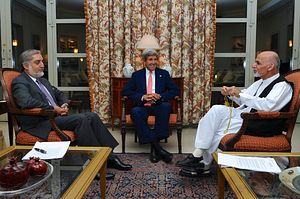A date has finally been set for Afghanistan’s already-delayed parliamentary and district council elections. Afghans should return to the polls on October 15, 2016, according to the country’s Independent Election Commission (IEC), but there are significant hurdles to overcome before then.
One immediate challenge is the allegation, reported by the New York Times and made by Javid Faisal, a spokesman for Afghan CEO Abdullah Abdullah, that “the current election commission has no legitimacy because it was their weak management of the previous election that brought us on the brink of chaos.” He went on to say that electoral reforms are a “precondition to any election” and that includes changes to the commission.
Martine van Bijlert, of the Afghanistan Analysts Network, noted in her evaluation of the news that the “Abdullah camp, apart from generally pushing for changes to the electoral system, has particularly insisted on the replacement of the Independent Election Commission (IEC) and Independent Electoral Complaints Commission (IECC).”
Van Bijlert noted that as slow-moving electoral reforms closed in on replacing some of the commissioners the commission pushed back, saying that the executive branch did not have the authority to remove them before their six-year terms were completed.
Electoral reform was one of the key elements of the political compromise between Ashraf Ghani and Abdullah that created the national unity government. It took months to negotiate a compromise and salvage a government out of a messy election marred by allegations of fraud. Included in the formation of the NUG was a promise to hold local elections within two years and convene an assembly to amend the constitution to create a prime minister position for Abdullah.
The parliamentary and district elections were supposed to be held in June 2015, but were delayed because reforms had not been enacted and security continued to be fragile. Ghani extended the current parliament’s terms until elections could be held, a move which some challenged as illegal.
For a country which has debated and contested (sometimes violently) the legitimacy of nearly every ruler it has had in the modern age, the ongoing push and pull is par for the course.
Even if October 15 is ultimately acknowledged as a target date for the elections, there are other significant challenges. One is the persistently fragile security situation. It not guaranteed that nine months from now Afghanistan will be stable enough to hold nationwide elections. Then there are funding questions, as the election is estimated to come with a pricetag of at least $65 million.
Further, as van Bijlert writes, discussions on real electoral reform continues to be plagued by two problems: “[O]n one hand, the lack of consensus on what the problems of the 2014 election were and, on the other hand, the lack of real options to decrease the likelihood of fraud, manipulation, and a contested outcome in the upcoming elections…”
Constructing a viable and legitimate government in Afghanistan is not unlike building a bicycle and riding it at the same time.

































